- Home
- George MacDonald
Phantastes: A Faerie Romance for Men and Women Page 4
Phantastes: A Faerie Romance for Men and Women Read online
Page 4
CHAPTER III
“Man doth usurp all space, Stares thee, in rock, bush, river, in the face. Never thine eyes behold a tree; ‘Tis no sea thou seest in the sea, ‘Tis but a disguised humanity. To avoid thy fellow, vain thy plan; All that interests a man, is man.” HENRY SUTTON.
The trees, which were far apart where I entered, giving free passageto the level rays of the sun, closed rapidly as I advanced, so that erelong their crowded stems barred the sunlight out, forming as it were athick grating between me and the East. I seemed to be advancing towardsa second midnight. In the midst of the intervening twilight, however,before I entered what appeared to be the darkest portion of the forest,I saw a country maiden coming towards me from its very depths. She didnot seem to observe me, for she was apparently intent upon a bunch ofwild flowers which she carried in her hand. I could hardly see her face;for, though she came direct towards me, she never looked up. But when wemet, instead of passing, she turned and walked alongside of me for a fewyards, still keeping her face downwards, and busied with her flowers.She spoke rapidly, however, all the time, in a low tone, as if talkingto herself, but evidently addressing the purport of her words to me.
She seemed afraid of being observed by some lurking foe. “Trust theOak,” said she; “trust the Oak, and the Elm, and the great Beech. Takecare of the Birch, for though she is honest, she is too young not to bechangeable. But shun the Ash and the Alder; for the Ash is an ogre,--youwill know him by his thick fingers; and the Alder will smother you withher web of hair, if you let her near you at night.” All this was utteredwithout pause or alteration of tone. Then she turned suddenly and leftme, walking still with the same unchanging gait. I could not conjecturewhat she meant, but satisfied myself with thinking that it would be timeenough to find out her meaning when there was need to make use of herwarning, and that the occasion would reveal the admonition. I concludedfrom the flowers that she carried, that the forest could not beeverywhere so dense as it appeared from where I was now walking; and Iwas right in this conclusion. For soon I came to a more open part, andby-and-by crossed a wide grassy glade, on which were several circles ofbrighter green. But even here I was struck with the utter stillness. Nobird sang. No insect hummed. Not a living creature crossed my way. Yetsomehow the whole environment seemed only asleep, and to wear even insleep an air of expectation. The trees seemed all to have an expressionof conscious mystery, as if they said to themselves, “we could, an’ ifwe would.” They had all a meaning look about them. Then I rememberedthat night is the fairies’ day, and the moon their sun; and Ithought--Everything sleeps and dreams now: when the night comes, it willbe different. At the same time I, being a man and a child of the day,felt some anxiety as to how I should fare among the elves and otherchildren of the night who wake when mortals dream, and find their commonlife in those wondrous hours that flow noiselessly over the movelessdeath-like forms of men and women and children, lying strewn and partedbeneath the weight of the heavy waves of night, which flow on and beatthem down, and hold them drowned and senseless, until the ebbtide comes,and the waves sink away, back into the ocean of the dark. But I tookcourage and went on. Soon, however, I became again anxious, though fromanother cause. I had eaten nothing that day, and for an hour past hadbeen feeling the want of food. So I grew afraid lest I should findnothing to meet my human necessities in this strange place; but oncemore I comforted myself with hope and went on.
Before noon, I fancied I saw a thin blue smoke rising amongst the stemsof larger trees in front of me; and soon I came to an open spot ofground in which stood a little cottage, so built that the stems of fourgreat trees formed its corners, while their branches met and intertwinedover its roof, heaping a great cloud of leaves over it, up towards theheavens. I wondered at finding a human dwelling in this neighbourhood;and yet it did not look altogether human, though sufficiently so toencourage me to expect to find some sort of food. Seeing no door, I wentround to the other side, and there I found one, wide open. A woman satbeside it, preparing some vegetables for dinner. This was homely andcomforting. As I came near, she looked up, and seeing me, showed nosurprise, but bent her head again over her work, and said in a low tone:
“Did you see my daughter?”
“I believe I did,” said I. “Can you give me something to eat, for I amvery hungry?” “With pleasure,” she replied, in the same tone; “but donot say anything more, till you come into the house, for the Ash iswatching us.”
Having said this, she rose and led the way into the cottage; which, Inow saw, was built of the stems of small trees set closely together, andwas furnished with rough chairs and tables, from which even the bark hadnot been removed. As soon as she had shut the door and set a chair--
“You have fairy blood in you,” said she, looking hard at me.
“How do you know that?”
“You could not have got so far into this wood if it were not so; and Iam trying to find out some trace of it in your countenance. I think Isee it.”
“What do you see?”
“Oh, never mind: I may be mistaken in that.”
“But how then do you come to live here?”
“Because I too have fairy blood in me.”
Here I, in my turn, looked hard at her, and thought I could perceive,notwithstanding the coarseness of her features, and especially theheaviness of her eyebrows, a something unusual--I could hardly call itgrace, and yet it was an expression that strangely contrasted withthe form of her features. I noticed too that her hands were delicatelyformed, though brown with work and exposure.
“I should be ill,” she continued, “if I did not live on the borders ofthe fairies’ country, and now and then eat of their food. And I see byyour eyes that you are not quite free of the same need; though, fromyour education and the activity of your mind, you have felt it less thanI. You may be further removed too from the fairy race.”
I remembered what the lady had said about my grandmothers.
Here she placed some bread and some milk before me, with a kindlyapology for the homeliness of the fare, with which, however, I was in nohumour to quarrel. I now thought it time to try to get some explanationof the strange words both of her daughter and herself.
“What did you mean by speaking so about the Ash?”
She rose and looked out of the little window. My eyes followed her; butas the window was too small to allow anything to be seen from where Iwas sitting, I rose and looked over her shoulder. I had just time tosee, across the open space, on the edge of the denser forest, a singlelarge ash-tree, whose foliage showed bluish, amidst the truer green ofthe other trees around it; when she pushed me back with an expressionof impatience and terror, and then almost shut out the light from thewindow by setting up a large old book in it.
“In general,” said she, recovering her composure, “there is no danger inthe daytime, for then he is sound asleep; but there is something unusualgoing on in the woods; there must be some solemnity among the fairiesto-night, for all the trees are restless, and although they cannot comeawake, they see and hear in their sleep.”
“But what danger is to be dreaded from him?”
Instead of answering the question, she went again to the window andlooked out, saying she feared the fairies would be interrupted by foulweather, for a storm was brewing in the west.
“And the sooner it grows dark, the sooner the Ash will be awake,” addedshe.
I asked her how she knew that there was any unusual excitement in thewoods. She replied--
“Besides the look of the trees, the dog there is unhappy; and the eyesand ears of the white rabbit are redder than usual, and he frisks aboutas if he expected some fun. If the cat were at home, she would haveher back up; for the young fairies pull the sparks out of her tail withbramble thorns, and she knows when they are coming. So do I, in anotherway.”
At this instant, a grey cat rushed in l
ike a demon, anddisappeared in a hole in the wall.
“There, I told you!” said the woman.
“But what of the ash-tree?” said I, returning once more to thesubject. Here, however, the young woman, whom I had met in the morning,entered. A smile passed between the mother and daughter; and then thelatter began to help her mother in little household duties.
“I should like to stay here till the evening,” I said; “and then go onmy journey, if you will allow me.”
“You are welcome to do as you please; only it might be better to stayall night, than risk the dangers of the wood then. Where are you going?”
“Nay, that I do not know,” I replied, “but I wish to see all that is tobe seen, and therefore I should like to start just at sundown.” “You area bold youth, if you have any idea of what you are daring; but a rashone, if you know nothing about it; and, excuse me, you do not seem verywell informed about the country and its manners. However, no one comeshere but for some reason, either known to himself or to those who havecharge of him; so you shall do just as you wish.”
Accordingly I sat down, and feeling rather tired, and disinclined forfurther talk, I asked leave to look at the old book which still screenedthe window. The woman brought it to me directly, but not before takinganother look towards the forest, and then drawing a white blind overthe window. I sat down opposite to it by the table, on which I laid thegreat old volume, and read. It contained many wondrous tales of FairyLand, and olden times, and the Knights of King Arthur’s table. I readon and on, till the shades of the afternoon began to deepen; for inthe midst of the forest it gloomed earlier than in the open country. Atlength I came to this passage--
“Here it chanced, that upon their quest, Sir Galahad and Sir Percivalerencountered in the depths of a great forest. Now, Sir Galahad was dightall in harness of silver, clear and shining; the which is a delightto look upon, but full hasty to tarnish, and withouten the labour of aready squire, uneath to be kept fair and clean. And yet withouten squireor page, Sir Galahad’s armour shone like the moon. And he rode a greatwhite mare, whose bases and other housings were black, but all besprentwith fair lilys of silver sheen. Whereas Sir Percivale bestrode a redhorse, with a tawny mane and tail; whose trappings were all to-smirchedwith mud and mire; and his armour was wondrous rosty to behold, ne couldhe by any art furbish it again; so that as the sun in his going downshone twixt the bare trunks of the trees, full upon the knights twain,the one did seem all shining with light, and the other all to glow withruddy fire. Now it came about in this wise. For Sir Percivale, after hisescape from the demon lady, whenas the cross on the handle of his swordsmote him to the heart, and he rove himself through the thigh, andescaped away, he came to a great wood; and, in nowise cured of hisfault, yet bemoaning the same, the damosel of the alder tree encounteredhim, right fair to see; and with her fair words and false countenanceshe comforted him and beguiled him, until he followed her where she ledhim to a---”
Here a low hurried cry from my hostess caused me to look up from thebook, and I read no more.
“Look there!” she said; “look at his fingers!”
Just as I had been reading in the book, the setting sun was shiningthrough a cleft in the clouds piled up in the west; and a shadow as of alarge distorted hand, with thick knobs and humps on the fingers, so thatit was much wider across the fingers than across the undivided partof the hand, passed slowly over the little blind, and then as slowlyreturned in the opposite direction.
“He is almost awake, mother; and greedier than usual to-night.”
“Hush, child; you need not make him more angry with us than he is; foryou do not know how soon something may happen to oblige us to be in theforest after nightfall.”
“But you are in the forest,” said I; “how is it that you are safe here?”
“He dares not come nearer than he is now,” she replied; “for any ofthose four oaks, at the corners of our cottage, would tear him topieces; they are our friends. But he stands there and makes awful facesat us sometimes, and stretches out his long arms and fingers, and triesto kill us with fright; for, indeed, that is his favourite way of doing.Pray, keep out of his way to-night.”
“Shall I be able to see these things?” said I.
“That I cannot tell yet, not knowing how much of the fairy nature thereis in you. But we shall soon see whether you can discern the fairies inmy little garden, and that will be some guide to us.”
“Are the trees fairies too, as well as the flowers?” I asked.
“They are of the same race,” she replied; “though those you call fairiesin your country are chiefly the young children of the flower fairies.They are very fond of having fun with the thick people, as they callyou; for, like most children, they like fun better than anything else.”
“Why do you have flowers so near you then? Do they not annoy you?”
“Oh, no, they are very amusing, with their mimicries of grown people,and mock solemnities. Sometimes they will act a whole play throughbefore my eyes, with perfect composure and assurance, for they are notafraid of me. Only, as soon as they have done, they burst into pealsof tiny laughter, as if it was such a joke to have been serious overanything. These I speak of, however, are the fairies of the garden.They are more staid and educated than those of the fields and woods.Of course they have near relations amongst the wild flowers, but theypatronise them, and treat them as country cousins, who know nothingof life, and very little of manners. Now and then, however, they arecompelled to envy the grace and simplicity of the natural flowers.”
“Do they live IN the flowers?” I said.
“I cannot tell,” she replied. “There is something in it I do notunderstand. Sometimes they disappear altogether, even from me, thoughI know they are near. They seem to die always with the flowers theyresemble, and by whose names they are called; but whether they return tolife with the fresh flowers, or, whether it be new flowers, new fairies,I cannot tell. They have as many sorts of dispositions as men and women,while their moods are yet more variable; twenty different expressionswill cross their little faces in half a minute. I often amuse myselfwith watching them, but I have never been able to make personalacquaintance with any of them. If I speak to one, he or she looks up inmy face, as if I were not worth heeding, gives a little laugh, and runsaway.” Here the woman started, as if suddenly recollecting herself, andsaid in a low voice to her daughter, “Make haste--go and watch him, andsee in what direction he goes.”
I may as well mention here, that the conclusion I arrived at from theobservations I was afterwards able to make, was, that the flowers diebecause the fairies go away; not that the fairies disappear becausethe flowers die. The flowers seem a sort of houses for them, or outerbodies, which they can put on or off when they please. Just as you couldform some idea of the nature of a man from the kind of house he built,if he followed his own taste, so you could, without seeing the fairies,tell what any one of them is like, by looking at the flower till youfeel that you understand it. For just what the flower says to you, wouldthe face and form of the fairy say; only so much more plainly as a faceand human figure can express more than a flower. For the house or theclothes, though like the inhabitant or the wearer, cannot be wroughtinto an equal power of utterance. Yet you would see a strangeresemblance, almost oneness, between the flower and the fairy, which youcould not describe, but which described itself to you. Whether all theflowers have fairies, I cannot determine, any more than I can be surewhether all men and women have souls.
The woman and I continued the conversation for a few minutes longer. Iwas much interested by the information she gave me, and astonishedat the language in which she was able to convey it. It seemed thatintercourse with the fairies was no bad education in itself. But now thedaughter returned with the news, that the Ash had just gone away in asouth-westerly direction; and, as my course seemed to lie eastward, shehoped I should be in no danger of meeting him if I departed at once.I looked out of the little window, and there stood the ash-tree, to myeyes the
same as before; but I believed that they knew better than Idid, and prepared to go. I pulled out my purse, but to my dismay therewas nothing in it. The woman with a smile begged me not to troublemyself, for money was not of the slightest use there; and as I mightmeet with people in my journeys whom I could not recognise to befairies, it was well I had no money to offer, for nothing offended themso much.
“They would think,” she added, “that you were making game of them; andthat is their peculiar privilege with regard to us.” So we went togetherinto the little garden which sloped down towards a lower part of thewood.
Here, to my great pleasure, all was life and bustle. There was stilllight enough from the day to see a little; and the pale half-moon,halfway to the zenith, was reviving every moment. The whole gardenwas like a carnival, with tiny, gaily decorated forms, in groups,assemblies, processions, pairs or trios, moving stately on, runningabout wildly, or sauntering hither or thither. From the cups or bells oftall flowers, as from balconies, some looked down on the masses below,now bursting with laughter, now grave as owls; but even in their deepestsolemnity, seeming only to be waiting for the arrival of the next laugh.Some were launched on a little marshy stream at the bottom, in boatschosen from the heaps of last year’s leaves that lay about, curled andwithered. These soon sank with them; whereupon they swam ashore and gotothers. Those who took fresh rose-leaves for their boats floated thelongest; but for these they had to fight; for the fairy of the rose-treecomplained bitterly that they were stealing her clothes, and defendedher property bravely.
“You can’t wear half you’ve got,” said some.
“Never you mind; I don’t choose you to have them: they are my property.”
“All for the good of the community!” said one, and ran off with a greathollow leaf. But the rose-fairy sprang after him (what a beauty she was!only too like a drawing-room young lady), knocked him heels-over-head ashe ran, and recovered her great red leaf. But in the meantime twenty hadhurried off in different directions with others just as good; and thelittle creature sat down and cried, and then, in a pet, sent a perfectpink snowstorm of petals from her tree, leaping from branch to branch,and stamping and shaking and pulling. At last, after another good cry,she chose the biggest she could find, and ran away laughing, to launchher boat amongst the rest.
But my attention was first and chiefly attracted by a group of fairiesnear the cottage, who were talking together around what seemed alast dying primrose. They talked singing, and their talk made a song,something like this:

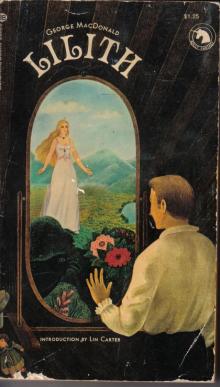 Lilith: A Romance
Lilith: A Romance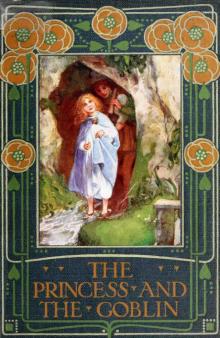 The Princess and the Goblin
The Princess and the Goblin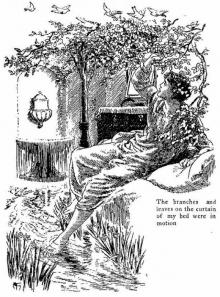 Phantastes: A Faerie Romance for Men and Women
Phantastes: A Faerie Romance for Men and Women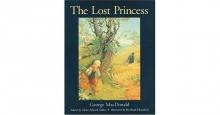 A Double Story
A Double Story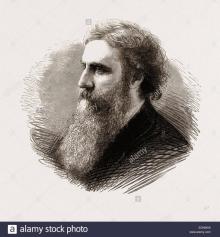 St. George and St. Michael
St. George and St. Michael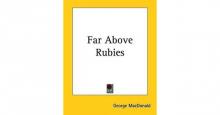 Far Above Rubies
Far Above Rubies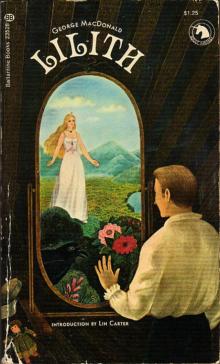 Lilith
Lilith